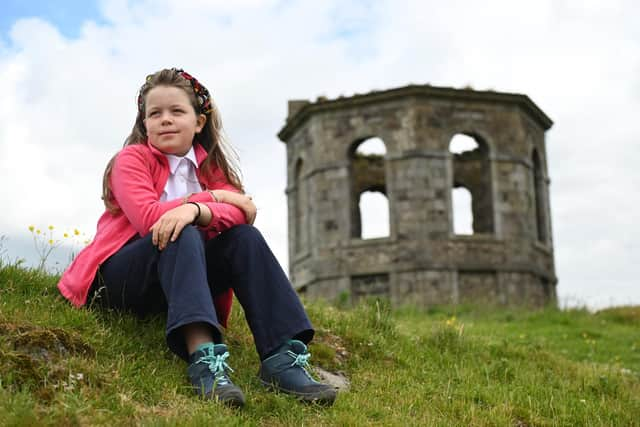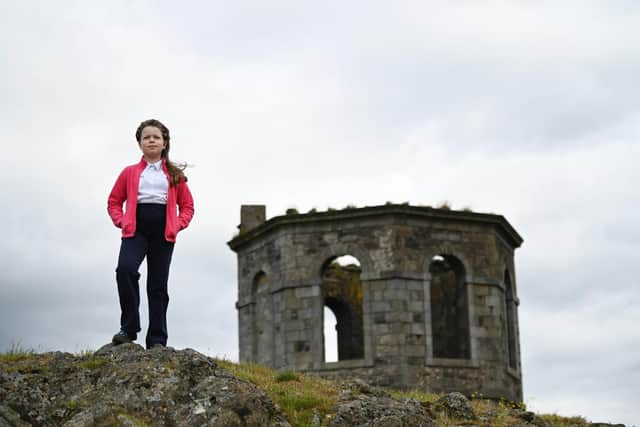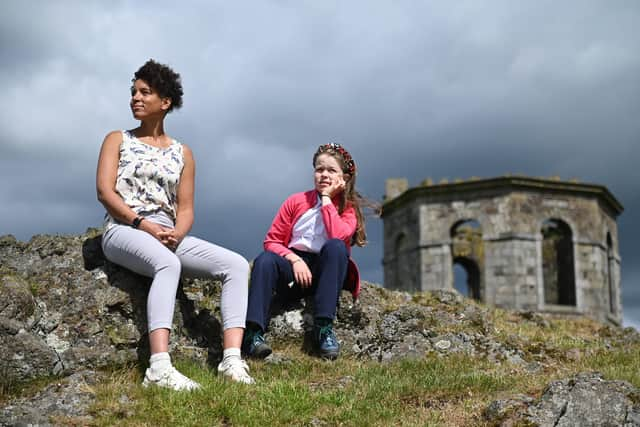Scottish schoolgirl's campaign to banish legacy of Scots slave trader
In reality, Colonel William McDowall amassed his extraordinary wealth on the back of the triangular slave trade, selling enslaved men, women, and children, and leading hundreds to their death.
Now a young mixed race girl has launched a campaign to banish his name from her primary school house, arguing that his bloody legacy is incompatible with its values.
Advertisement
Hide AdAdvertisement
Hide AdIn the wake of George Floyd’s murder and the Black Lives Matter movement, Erin, a P7 pupil at Lochwinnoch Primary, began researching McDowall’s life, and discovered his involvement in the slave trade.
The 11-year-old, captain of the school’s McDowall House, wrote to the school, reasoning that pupils would not be happy if they knew the full extent of McDowall’s slaving past.
At first, she received an encouraging response, with the school newsletter praising her “very mature research” and promising to look at the house renaming “as a whole school”.
But a year on, Erin, whose maternal grandfather hails from Kenya, said she is frustrated at how the issue has been handled.
What was billed as a survey in April saw 52 per cent of families in favour of retaining the house name, with 48 per cent wanting change. The school, Erin said, presented that as a “deciding vote”.


A letter asking the school to revisit the issue was signed by more than 50 parents. A subsequent message from the school noted “strength of feeling on both sides” and acknowledged that many felt their voice was not heard.
However, when another vote was held, one option was to keep the name, with the other citing the need for “further conversations” based on families’ “own knowledge”, with no mention of McDowall’s slavery role.
That role is an ignominious one.


McDowall owned 13 enslaved Africans on his inaugural sugar plantation on St Kitts. By 1710, the number had reached 191, including 45 children. The historical researcher, Dr Stuart Nisbet, estimates that McDowall went on to own or control at least 1,000 slaves.
Advertisement
Hide AdAdvertisement
Hide AdHe and his business partner, James Milliken, were the Leeward agents for the Hannover, one of the earliest recorded Scottish slaving voyages. It set sail from Port Glasgow in 1719, trading provisions for slaves in what is now Ghana.
Around a quarter of them died at sea. The survivors, 15 children among them, were sold by McDowall.
He and Milliken purchased a larger slave ship, the Fair Parnelia, but its maiden voyage ended in disaster, drowning 282 men, women and children.


When McDowall returned to Scotland, he shipped home more than a dozen slaves. Research by the University of Glasgow’s uncovered a 1748 newspaper advertisement seeking the whereabouts of Cato, a “Negro lad” who had fled McDowall’s country pile at Castle Semple in Lochwinnoch.
Dr Stephen Mullen, a research associate in Scottish history at the University of Glasgow, and an expert in Scotland’s ties to the slave trade, said: “William McDowall’s multifarious connections to slavery – as overseer, resident and absentee planter, enslaver in Scotland and the Caribbean, trafficker of enslaved people, and West India merchant – mark him out as one the most heavily complicit figures in Scotland’s slavery past.”
In Erin’s view, it is inconceivable that McDowall’s name can continue to be associated with the school, regardless of how his riches improved the village’s infrastructure.
“I was quite shocked to find out everything, and optimistic other people would want change,” she said. “I had hoped we would have made much more progress.”
The second vote saw 54 per cent of families in favour of retaining the house name, with 46 per cent backing “further discussion”.
Advertisement
Hide AdAdvertisement
Hide AdErin’s mother Leah said: “The concept of voting on whether you’re allowed to have a discussion seems quite an undemocratic response to the issue. It shouldn’t require a majority vote to simply talk about something as important as this.”
Now Erin has met with Intercultural Youth Scotland and written to Renfrewshire Council, Tom Arthur MSP and Mhairi Black MP.
The latest school newsletter noted the issue was of “wider interest to the community”, with the school committing to “explore” its history and celebrate Lochwinnoch’s diversity.
That has been welcomed by Erin’s family, who emphasise the village is a “beautiful, welcoming” community. Although Erin will be starting high school in August, she is determined to see a proper debate.
She said: “I think it’s the school’s responsibility to educate and hopefully change the views of many people who hold outdated and racist beliefs.
“I have many role models who try to make a change, and refuse to take no for an answer. Just like them, I won’t take no for an answer and I’ll be supporting future P7 pupils.”
A spokesman for Renfrewshire Council, which is investigating its historic links to slavery and colonialism, said: “We commend Erin for the mature way she has raised awareness of this very important issue and fully support her efforts to engage the school in this matter. We are sorry the matter has not been able to be resolved by the end of the school year.
“When the matter was first raised, in support of Erin’s contribution and in discussion with her, the school carried out a survey both with pupils and parents, and then the wider school community, to reach a wider consensus on the way forward.
Advertisement
Hide AdAdvertisement
Hide Ad“The result was extremely close and concerns were expressed the consultation did not reach everyone effectively. As such the engagement was widened further through a number of different ways people could express their views."
He added: “In recognition of this and in line with the school’s values, the head teacher decided to set up a group to discuss the matter at the start of the next school year to bring the matter to a conclusion, and Erin will be able to continue to contribute to that going forward.”
